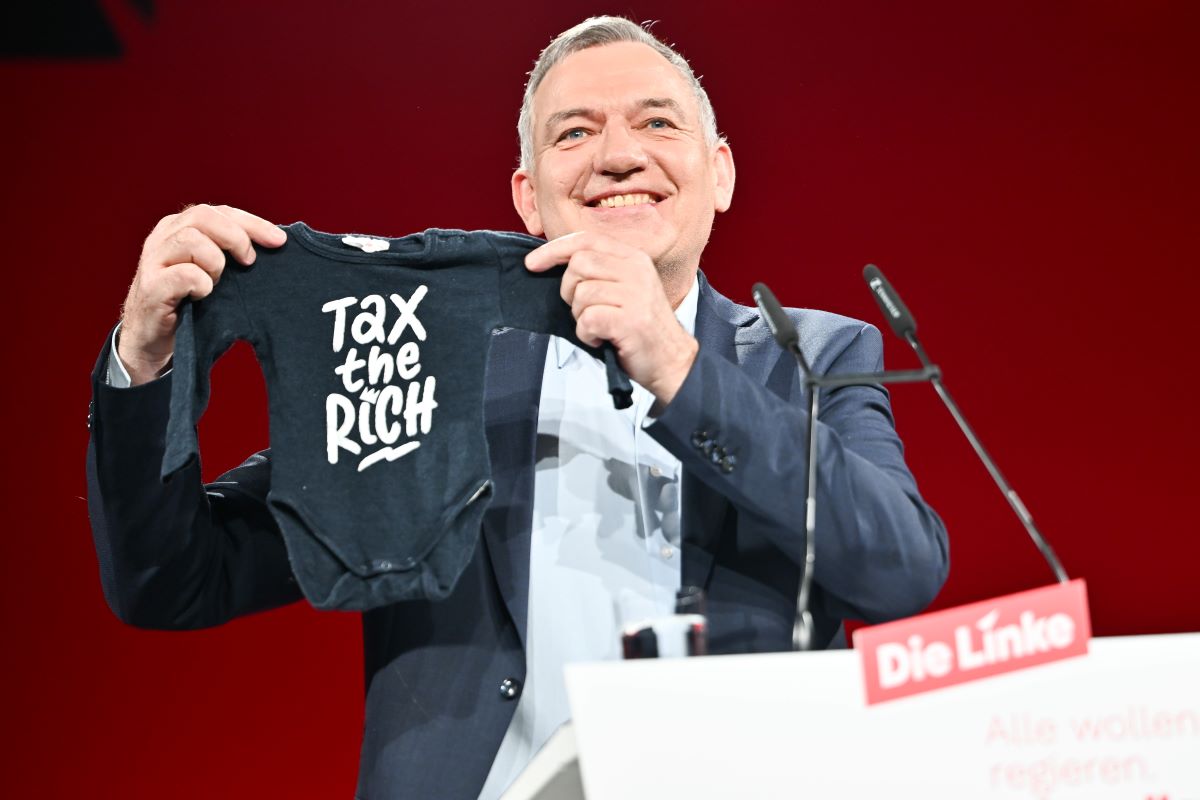With less than a month to go before German voters head to the polls to elect a new federal government, it’s looking increasingly clear that the conservative Christian Union parties (CDU/CSU) will claim the biggest share of votes, and Union leader Friedrich Merz will take the reigns as the next chancellor.
So the fact remains that Germany’s next majority coalition will most likely be composed of the Union and either the Social Democrats or the Greens.
But what has changed in the most recent polls, is that Germany’s Left party (Die Linke) may have just pulled itself above the five percent threshold to stay in the Bundestag. (Parties that fail to achieve five percent of the total vote don’t get any seats in Germany's parliament.)
That’s according to ZDF’s latest “Politbarometer,” which was updated on Friday. Some other polls, like the YouGov poll or Politico’s “Poll of Polls” still show the Left party below the five percent mark at time of writing.
The result can be seen as a solid step in the right direction for the Left, which hadn’t achieved five percent or more in a nationwide poll since October of 2023 when Sahra Wagenknecht had just split ways with the party to form her self-named party (the BSW).
“The Left Party can hope to re-enter the Bundestag after all,” wrote German daily newspaper Tagesspiegel about the result.
What does the Left Party stand for?
For readers unfamiliar with Die Linke, the party advocates for democratic socialism. It’s also vocally anti-fascist and anti-militarist.
It was officially founded in 2007 when two parties merged, those being Labour and Social Justice – The Electoral Alternative (WASG) and the Party of Democratic Socialism (PDS). The latter was a direct descendent of the Socialist Unity Party of Germany (SED), which ruled in former East Germany as the only governing party until 1990.
The Left’s current election campaign is focused on proposals to reduce burdens for Germany’s working class, such as by implementing stricter rent price caps and cutting down some basic living costs.
On these issues the Left agrees with the centre-left SPD and Green parties to some extent. For example, all three parties say they will work to raise the minimum wage in Germany.
But the Left goes a step further than its centre-left counterparts in terms of measures it would implement: While the SPD wants to reduce value added tax (VAT) on groceries by two percent, the Left would see taxes on groceries cut to zero.
At the party’s recent campaign convention, Jan van Aken, one of the party's top candidates, attempted to distance The Left from the SPD and Greens. Those parties had discussed rent caps and wealth taxes but they failed to implement them in government, he argued.
"We will not stop fighting for a rent freeze, even if it takes five years…because people need it,” van Aken said in a speech to the party, DPA reported.
READ ALSO: OPINION - Why challenging your high rent in Germany is a civic duty to other tenants
The Left party also calls for a wealth tax on Germany’s richest 2.5 percent, wants to reduce the retirement age from 67 to 65, would like to reinstate the 9-euro transport ticket (in place of the now 58-euro Deutschlandticket), and says it would not support further tightening restrictions on asylum seekers.

What role would the Left play in the future government?
Unfortunately, for voters who might support the Left’s ambitious policy proposals, as of now there is little chance that the party would be able to implement many (if any) of the items in their campaign manifesto.
As mentioned above, the Left first needs to secure enough votes to remain in the Bundestag at all.
But assuming it does that, there is virtually no hope for the party of joining a governing coalition with the CDU at the helm. In recent years the CDU party has refused to cooperate with the Left, essentially putting both the Left and the far-right Alternative for Germany (AfD) on the other side of its firewall (or Brandmauer). More recently, CDU Friedrich Merz has called for an overhaul of Germany’s asylum rules, signalling that the CDU is closer to agreement with the AfD than the Left, at least on migration issues.
So in Germany’s next government, the Left party would most likely continue to play the role of a minority opposition party.
With just a few seats in the Bundestag, the Left could not realistically expect to pass its wealth tax, for example.
But it could continue to support the opposition to the far-right, joining with the SPD, the Greens and others in condemning any actions that empower the AfD or further its anti-immigration policies.
It would also likely join the growing chorus which is calling for an end to Germany debt brake, which has limited the country's ability to fully finance defence and social welfare in recent years.
The Left could also be expected to oppose the CDU’s plan to scrap the dual citizenship law. The party was a proponent of more liberal naturalisation laws since the beginning of the dual-citizenship debate.
What’s surprising about the latest poll result?
Winning just over five percent of the vote is not a result that many would describe as a victory, but at this point simply remaining in the Bundestag would be a big win for the Left.
Notably, the party does not accept donations from corporate interests. So whatever success the Left achieves is truly a testament to their proposals resonating with working-class voters.

Comments